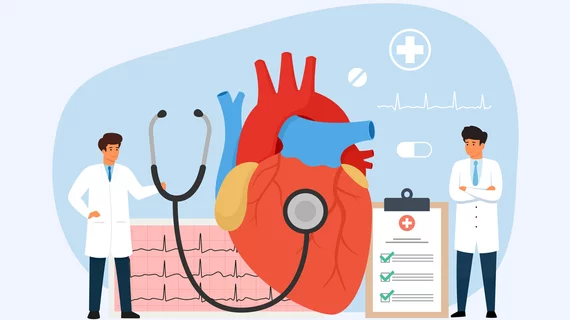Rising heart failure, AFib rates a ‘wake-up call’ for US cardiologists
Patient care in the United States has never been more advanced than it is today, with artificial intelligence and other emerging technologies evolving at a remarkable rate. However, due to an aging population, a worsening physician shortage and other ongoing challenges, providers still face a healthcare environment where disease rates are on the rise.
Heart failure rates expected to keep climbing
Consider, for instance, a new report from the Heart Failure Society of America that identified rising rates of heart failure and heart failure-related mortality in the United States. The data suggest this trend is getting especially bad among younger patients.
According to the report, approximately 6.7. million Americans over the age of 20 currently live with heart failure. By 2030, that number is expected to be closer to 8.7 million. By 2050, meanwhile, it could be as high as 11.4 million.
“The shifts in age distribution, worsening in mortality rates, widening racial and ethnic disparities—which may be a reflection of systematic and structural barriers to appropriate and timely healthcare—should be a wake-up call for clinicians, payers, legislators, funding agencies, and the overall healthcare system,” Biykem Bozkurt, MD, PhD, chair of the report’s writing group as well as a cardiologist and researcher with Baylor College of Medicine, said in a statement. “We need to address worsening trends in heart failure, not only through medical interventions and properly implemented guideline-directed medical therapy, but by tackling the growing challenges in health care regarding access and coverage for appropriate and timely care, the effect of mis-incentivization of wrong care such as inappropriate discontinuation of therapies, and social determinants of health that are driving widening disparities.”
The report also highlighted some of the many issues impacting care teams on a daily basis, calling out modern coding practices that may be potentially painting an incomplete picture of current trends.
The report, HF STATS 2024: Heart Failure Epidemiology and Outcomes Statistics, was published in full in the Journal of Cardiac Failure.[1]
Atrial fibrillation much more prevalent than experts realized
Another recent analysis out of the University of California San Francisco (UCSF) found that atrial fibrillation (AFib) is much more common among in the United States researchers had previously estimated.
According to that study, published in the Journal of the American College of Cardiology, approximately 10.5 million U.S. adults have AFib, up significantly from an earlier estimate of 3.3 million.[2]
“Physicians recognize that AFib is often encountered in essentially every field of practice,” senior author Gregory M. Marcus, MD, a cardiologist with University of California, San Francisco (UCSF) Health said in a statement. “These data provide objective evidence to demonstrate that prior projections severely underestimated how common it truly is.”
One key detail about AFib is that it can be spotted early. Patients can play an important role in their own care by wearing a remote monitor if recommended by their doctor.
“Fortunately, AFib is preventable, and early detection and appropriate treatment can substantially reduce its adverse outcomes,” first author Jean Jacques Noubiap, MD, PhD, a postdoctoral researcher with UCSF, said in the same statement.

